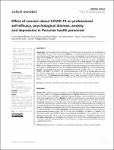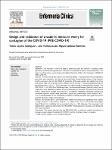Mostrar el registro sencillo del ítem
Depression, COVID-19 anxiety, subjective well-being, and academic performance in university students with COVID-19-infected relatives: a network analysis
| dc.contributor.author | Ventura León, José | |
| dc.contributor.author | Caycho Rodríguez, Tomás | |
| dc.contributor.author | Talledo Sánchez, Karim | |
| dc.contributor.author | Casiano Valdivieso, Kenia | |
| dc.date.accessioned | 2022-04-08T17:03:19Z | |
| dc.date.available | 2022-04-08T17:03:19Z | |
| dc.date.issued | 2022-02-10 | |
| dc.identifier.citation | Ventura, J., ...[et al.]. (2022). Depression, COVID-19 anxiety, subjective well-being, and academic performance in university students with COVID-19-infected relatives: a network analysis. Frontiers in Psychology, 13. https://doi.org/10.3389/fpsyg.2022.837606 | es_PE |
| dc.identifier.uri | https://hdl.handle.net/11537/29889 | |
| dc.description.abstract | This study aimed to examine the relationship between anxiety, depression, subjective well-being, and academic performance in Peruvian university health science students with COVID-19-infected relatives. Eight hundred two university students aged 17–54 years (Mean 21.83; SD = 5.31); 658 females (82%) and 144 males (18%); who completed the Patient Health Questionnaire-2, Coronavirus Anxiety Scale, Subjective Well-being Scale (SWB), and Self-reporting of Academic Performance participated. A partial unregularized network was estimated using the ggmModSelect function. Expected influence (EI) values were calculated to identify the central nodes and a two-tailed permutation test for the difference between the two groups (COVID-19 infected and uninfected). The results reveal that a depression and well-being node (PHQ1-SWB3) presents the highest relationship. The most central nodes belonged to COVID-19 anxiety, and there are no global differences between the comparison networks; but at the local level, there are connections in the network of COVID-19-infected students that are not in the group that did not present this diagnosis. It is concluded that anxious–depressive symptomatology and its relationship with well-being and evaluation of academic performance should be considered in order to understand the impact that COVID-19 had on health sciences students. | es_PE |
| dc.format | application/pdf | es_PE |
| dc.language.iso | spa | es_PE |
| dc.publisher | Universidad Andrés Bello | es_PE |
| dc.rights | info:eu-repo/semantics/openAccess | es_PE |
| dc.rights.uri | https://creativecommons.org/licenses/by-nc-sa/4.0/ | * |
| dc.source | Universidad Privada del Norte | es_PE |
| dc.source | Repositorio Institucional - UPN | es_PE |
| dc.subject | Depresión | es_PE |
| dc.subject | Ansiedad | es_PE |
| dc.subject | Covid-19 | es_PE |
| dc.subject | Estudiantes universitarios | es_PE |
| dc.subject | Rendimiento académico | es_PE |
| dc.title | Depression, COVID-19 anxiety, subjective well-being, and academic performance in university students with COVID-19-infected relatives: a network analysis | es_PE |
| dc.type | info:eu-repo/semantics/article | es_PE |
| dc.publisher.country | CL | es_PE |
| dc.identifier.journal | Frontiers in Psychology | es_PE |
| dc.description.peer-review | Revisión por pares | es_PE |
| dc.subject.ocde | https://purl.org/pe-repo/ocde/ford#5.01.02 | es_PE |
| dc.description.sede | Los Olivos | es_PE |
| dc.identifier.doi | https://doi.org/10.3389/fpsyg.2022.837606 |






